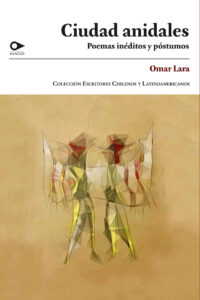 Omar Lara: Ciudad anidales: Poemas inéditos y póstumos
Omar Lara: Ciudad anidales: Poemas inéditos y póstumos
“The unpublished texts that make up this farewell are connected like a slow, whispered speech from a voice gradually falling silent; the numbers that separate them are like pauses in which to breathe, which is something those who are saying goodbye need to do. Among its overwhelming images we find a pair of hands saying ‘goodbye forever,’ sparkling eyes on the verge of tears, telling us, ‘I’d like to stay longer, but I’ve done all I can and I’m tired.’ With all my love and all my pain, I receive this book as a treasure. I cherish it, hold it in my arms and close my eyes to see the friend I loved for so long, through so much treachery, holding my hands and calling me ‘my beautiful girl.’ May his readers, friends, and not-so-much friends see here what Omar reminds them of, and among us all, may we keep him alive for as long as we don’t die our own deaths.” – Zenaida M. Suárez Mayor
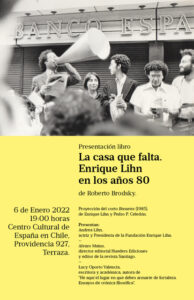 Roberto Brodsky: La casa que falta: Catálogo discursivo de Enrique Lihn, 1980–1988
Roberto Brodsky: La casa que falta: Catálogo discursivo de Enrique Lihn, 1980–1988
Facing the censorship and authoritarianism of the era, during the 1980s Enrique Lihn set poetry to one side in order to unveil a set of “crazy projects,” according to Christopher Travis’s apt definition, thereby revealing a radical nature unique within the critical and intellectual production of his time. La casa que falta addresses these materials, for the first time, starting from the conception of a “total social act,” following Lévi-Strauss’s definition of the language acts that demand a complete interpretation. Parody, mocking, provocation, and a rigorous defense of art’s autonomy transformed Lihn into a new sort of hero, dedicated to shedding light on the era’s forbidden discourse and inspiring the new generations that would emerge with Chile’s return to democracy the year of his death.
 Víctor Manuel Pinto: Welserland
Víctor Manuel Pinto: Welserland
“Welserland is one of those beginnings: the criminal, genetic deed that blossomed in America with the arrival of those who settled in the New World and left the imprint of their abuses, including the massacres caused by their madness and ambition, summed up in their many bastard children. Víctor Manuel Pinto’s whole book is that gothic typescript, an intrusion into the soul of a continent that was devastated, with the mark of a religion and the echo of a language that swept through almost all of the New World. Two emblems in whose name the ancient tradition of gods who dwelled in land and sea was undone.” – Alberto Hernández
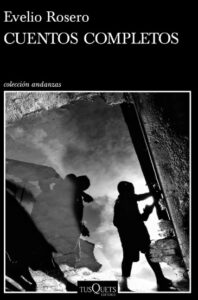 Evelio Rosero: Cuentos completos
Evelio Rosero: Cuentos completos
The stories of Evelio Rosero represent a social and psychological X-ray of Colombia, and especially of its urban landscape. Poetic, with a romantic lyricism, they reflect the author’s concern for matters such as the passing of time, love, death, the purest fantasy, and lust… But they can also take the shape of a dream, one that transforms into a nightmare and haunts the sleeper until they collapse into epileptic seizures. Rosero applies his sharp and sometimes disillusioned gaze while he portrays the habits of a corrupt and outdated society, at times ruthlessly violent, or makes our imaginations run wild when poetry takes over the page and leaves the reader dazzled.
 Sol Linares: Mamás por WhatsApp
Sol Linares: Mamás por WhatsApp
“Readers shouldn’t be fooled by this novel. You will definitely laugh and think the story is very fresh and witty. And yes, you’ll have a good time, but you must also understand that the novel’s grace is based on the diaphragm of a disbelieving humor that gives the world no respite. Because the world, as we know, doesn’t give anyone a break. We either sink or we laugh, and this millennial girl, a divorced mother, who lives in a Venezuela overwhelmed by long-distance feelings sheltered by a virtual world, decides not to let herself be defeated so easily. In the midst of a pandemic, our girl turns to herself and contemporary ways, beginning to deliver wonderful slashes of humor and poetry. Real literature doesn’t empathize with the clichés of existence, or with fashions, or with the militancies of its time, and Sol Linares, in Mamás por Whatsapp, proves it: her character may be very millennial, but she doesn’t believe in anything or anyone.” – Fedosy Santaella
 Karla Suárez: El hijo del héroe
Karla Suárez: El hijo del héroe
At the age of twelve, Ernesto receives news in Havana that his father has died in the war in Angola. A war in which, between 1975 and 1991, thousands of Cubans participated. In the eyes of others, Ernesto becomes the son of a hero, and the weight of this responsibility will change his life. Growing up through different ages and moving between different cities, he is haunted by the ghost of his father, whose death he attempts to piece together. Ernesto will reflect on the long period of Cuban presence in Africa and will seek his own place in the world. This quest will lead him to understand that reality may not be exactly as one thinks. In this extraordinary novel, Karla Suárez makes us take part in the way capital-H History stands in the way and conditions individual dreams of freedom.
 Daniel Titinger: El hombre más triste: Retrato del poeta César Vallejo
Daniel Titinger: El hombre más triste: Retrato del poeta César Vallejo
Daniel Tittinger recounts the life and times of César Vallejo, starting from the ongoing mystery surrounding the illness that ended his life in Paris in 1938. This is a biography of the writer consisting of interviews with people close to him, written biographies of the poet and, of course, the author’s own intuitions as a reader of Vallejo. Tittinger’s prose is precise and entertaining, and accounts for the many personal and historical circumstances that influenced Vallejo’s works. (Santiago, Universidad Diego Portales, 2021)
 Guillermo Riedemann: Después es siempre antes. Antología poética
Guillermo Riedemann: Después es siempre antes. Antología poética
“Guillermo Riedemann’s poetry has problematized its limits, expanded its field of action, made its own shores less rigid and, therefore, more expansive. What sounds like a self-parody from other poets—a tired and scratchy idiolect that repeats the same music and the same mantra—becomes in Riedemann’s poetry a vital, political, loving logos, not taking himself or his lyrical work seriously, which transforms these texts into little manifestos of lucidity, where all the loss of existence gains in skepticism but also in faith in being redeemed by the love of others. The only fates capable of attaining importance are those of individuals, and the horizon of one is the horizon of all: each human being is responsible for the fate of all human beings, as Sartre told us. Tired of his personal desert or mountain, he takes up a voice that multiplies and pierces us with the perplexity of the hunter or the cornered prey, of the tortured or the torturer, of political power or the one oppressed by that same power.” – Ricardo Herrera Alarcón
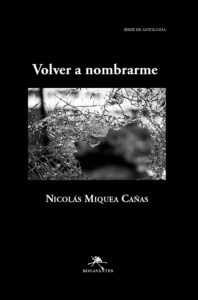 Nicolás Miquea Cañas: Volver a nombrarme. Antología poética
Nicolás Miquea Cañas: Volver a nombrarme. Antología poética
“Miquea’s poetry navigates between the search for words, awareness of his own fragility, and a certain unmentionable political condition, in the sense that he recovers memory through expressive resources that avoid direct reference or name it tangentially. We cannot know if this is the result of a certain modesty in the face of the story of evil (what Coetzee points out in Elizabeth Costello: showing horror is an obscene gesture), an avoidance of pamphleteering, or if perhaps he prefers to seek the attentive complicity of the reader. Perhaps it is always this way, and there is no way of writing and reading other than through the wink the author gives to those who pass through his pages. But it is evident that, in this case, the poet demands greater effort, because one cannot move the audience with just an easy joke or a sentimental speech. This is his strong suit: his great verbal and vital imprint, which, from his first book up to the unpublished poems of Samosata y su modo de contar historias, defines him as an unique poet in the panorama of Chilean poetry, due to the forcefulness of his language and his careful confluence of tradition and rupture, which plays with the boundaries of the classic and the avant-garde, without losing sight of that humanity—precarious and fragile—that he hopes to redeem in these writings that seek an authentic way to name and be named with old or renewed words.” – Luis Riffo
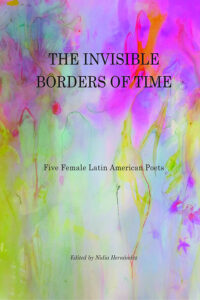 Several authors: The Invisible Borders of Time: Five Female Latin American Poets
Several authors: The Invisible Borders of Time: Five Female Latin American Poets
The Invisible Borders of Time: Five Female Latin American Poets is a new anthology edited by Venezuelan-born editor and poet Nidia Hernández. In this collection, Hernández, winner of the Sundara Ramaswamy prize for The Land of Mild Light: Selected Poems of Rafael Cadenas, gathers the voices of Cristina Peri Rossi (Uruguay), Piedad Bonnett (Colombia), Yolanda Pantin (Venezuela), Carmen Boullosa (Mexico), and Rossella Di Paolo (Peru)—five award-winning Latin American poets—into a definitive bilingual anthology. This collection, representative of the region’s rich poetic history, samples the poetry of trailblazing female voices from the last sixty years.
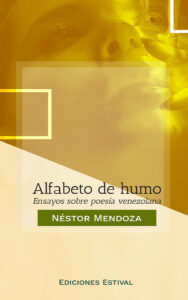 Néstor Mendoza: Alfabeto de humo. Ensayos sobre poesía venezolana
Néstor Mendoza: Alfabeto de humo. Ensayos sobre poesía venezolana
“The skill applied in these brief essays is striking; it hits the target of the aesthetic essence of each author as a subject of study. Mendoza uses references from various sources: Coldplay songs, memories of his childhood, tactile sensations of encounters with books, as well as the citations proper to a connoisseur of comparative literature to explain what is essential in the work of each poet, described as if from the perspective of observing a rare bird or dissecting a chimera. We notice, ergo, the mythical strength of the centaur, as Alfonso Reyes baptized the essayistic genre in La experiencia literaria. Avid poetry readers will enjoy this book, as will those with some unfathomable phobias, since the book will reveal to them a seldom-outlined form, as well as a fervent attitude toward reading, like a detective’s: the critical attitude so often lacking in Latin America, that art that springs from the foam of raging art.” – Alma Karla Sandoval
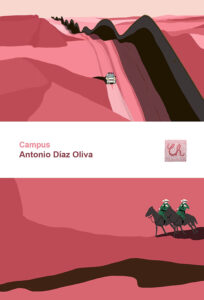 Antonio Diaz Oliva: Campus
Antonio Diaz Oliva: Campus
Campus is a sharp, satirical novel about the Latinos and Hispanics who chase the American dream in its academic form. It is also a confirmation of an author who, from his own experience as a student and professor in American universities, is able to laugh deliriously at the funny and terrible monsters that can be found in Spanish departments, and, above all, at the miseries of the human condition, before the human condition can laugh back at us. The book is available now from Chatos Inhumanos.
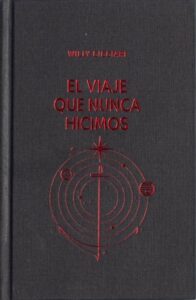 Willy Cicciari: El viaje que nunca hicimos
Willy Cicciari: El viaje que nunca hicimos
If La rosa de mis vientos was Willy Cicciari’s initial published journey through a seaside world of winds and water, this second book is the continuation of the same route, but with the element of fire accompanying the author on a new odyssey: an imaginary journey through a real world, or vice versa. El viaje que nunca hicimos is an astrological and sidereal jaunt, a book of poems full of mystery and darkness, places where Willy’s deepest passions and feelings are born.
 Adriana Riva: Ahora sabemos esto
Adriana Riva: Ahora sabemos esto
“The path is full of stumbling blocks and difficulties; the text goes back and forth. Words are repeated, over and over. The music of repetition is the sound of repeated attempts. Where do you enter? How do you get into a mother? Through humor, through love, or through pain? And even more: what is a mother? How do you know her? Where does she come from? The origin of a mother is the origin itself, and if this mother doesn’t speak, the poem will speak, the one that is being written and the one that mother and daughter read together: the Odyssey. How did Odysseus and Laertes do it? How did Telemachus and Odysseus do it? Maybe they can offer clues. Adriana Riva follows them, and speaks on what is most particular, anchored to what is most universal: affiliation, the gods, and so many all-powerful figures that suddenly look upon us, confused, not knowing what to say. Mother and daughter can thus avoid intimacy and yet remain intimate in that well-lit scene, cups of coffee on the table, accompanied by dictionaries and the first poem of Western literature.” – Laura Wittner
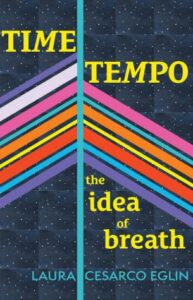 Laura Cesarco Eglin: Time/Tempo: The Idea of Breath
Laura Cesarco Eglin: Time/Tempo: The Idea of Breath
Laura Cesarco Eglin knows that there is not just one way to experience time, and in her groundbreaking chapbook Time/Tempo: The Idea of Breath she uses poetry as the place to contest commonly accepted ideas on time. “Tempo,” as well as a particular rhythm, means “time” in Portuguese: we translate our rhythm and experiences of time in society. Time as breathing, time as pause, time as memory, and how the present is part of the past, death as part of being alive, time as important, time as a factor in relationships, time as a partner, time as language, and time as part and parcel of who we are.
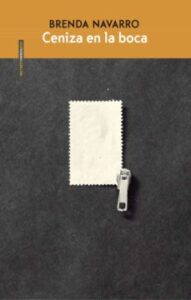 Brenda Navarro: Ceniza en la boca
Brenda Navarro: Ceniza en la boca
Diego jumps from the fifth floor, and from then on, the image won’t stop boring into his sister’s head: in six seconds, a body crashes into the ground. It is his sister who looks back and tells the story of the two siblings. Their arrival in the world at a home where life is never fair to them. The years they spent in Mexico with their grandparents, while their mother was away, looking for a life in Spain, and she, still a child, took care of Diego. Their stay in Madrid was a time when they didn’t understand the city and it didn’t understand them either. The first separation was when she went to Barcelona to get ahead while her brother stayed in the place he hated the most. And she returned, bearing Diego’s ashes, to find herself in a Mexico markedly different from the one she remembered. This novel narrates the emotional journey of a young woman who fathoms the reasons for her brother’s suicide and suffers her own Ulysses syndrome, in which neither going nor coming back is really her fate. This is a story of separations and abandonments, of loss and initiation into life, in which Brenda Navarro bravely tackles elusive questions of inequality, xenophobia, and rootlessness, making her one of the most powerful and daring storytellers of our literature. Written with heart and soul, Ceniza en la boca is a book that burns and raises the painful question of what makes life worth living.
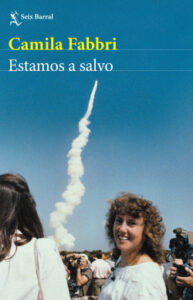 Camila Fabbri: Estamos a salvo
Camila Fabbri: Estamos a salvo
For the protagonists of these stories—mostly women and children—other people, as well as the animal world and natural phenomena, are at once a mirror of their behaviors and reactions, and a source of omnipresent, atavistic dangers. From “Sobras,” where the father of the narrator’s friend owns a caiman as a pet, to “Triste reino animal,” which tells of a mature actress’s affair with a much younger sound engineer, passing by the stunned mother of “Plantas sin tutor” or the husband trapped in a shopping mall in “El cielo es siempre fondo,” an air of surveillance hovers over the characters, forcing them to maintain a constant state of alert, like that of an animal in the jungle. Author of Los accidentes and El día que apagaron la luz, Camila Fabbri offers a collection of stories that stand out for their crudeness and unsettling pace. In all of them, there is a conflict that is not made explicit, but rather accumulates tension from one to the next. And yet, despite the human frailty they display, the possibility of renewing and surviving is as real as the magnitude of the threats.
 Andrés Neuman: Umbilical
Andrés Neuman: Umbilical
A man awaits the birth of his son. Fascinated, he watches over the soon-to-be mother during her pregnancy, imagining the being who will change everything in his house, his language, his partner, and his own family history. Throughout a memorable year, the man narrates the first stages of a new existence: him as a father, together with mother and son, three characters in a universal story finding newborn words. Umbilical is a lyrical story whose aims resonate intimately and collectively. Neuman’s reflections on the experience of fatherhood place masculinity face-to-face with the miracle of life and its incessant rereading of the present at a time when roles are being redefined, thus accepting the invitation of poet Anne Waldman, with whose words these pages begin: “Tell the man to give up tumult for the while / To wonder at the sight of baby’s beauty.” But it is also, and above all, a declaration of love.



